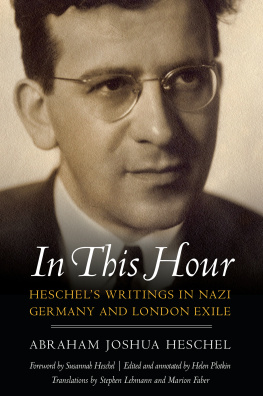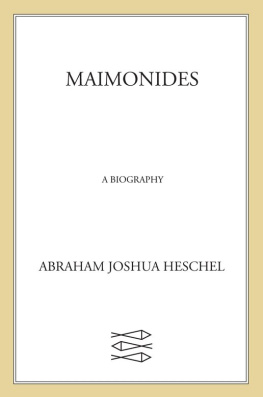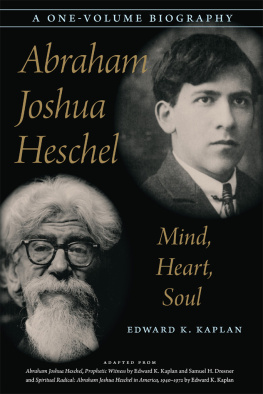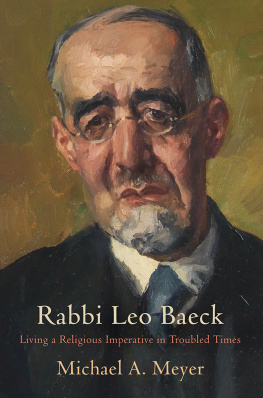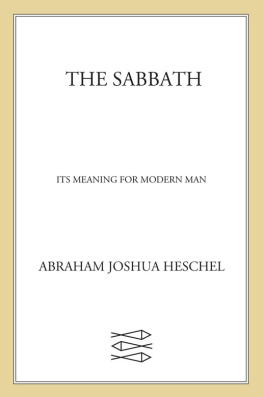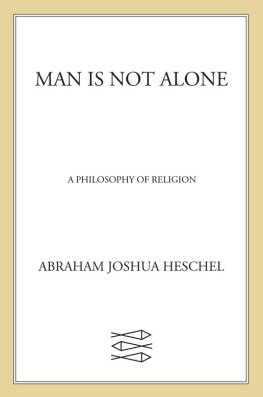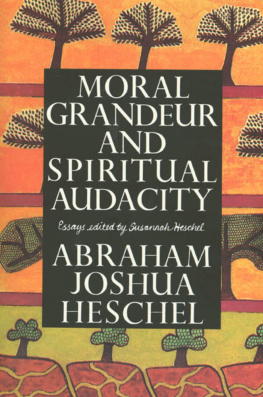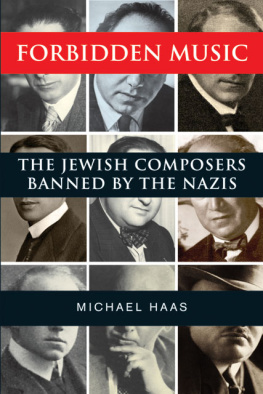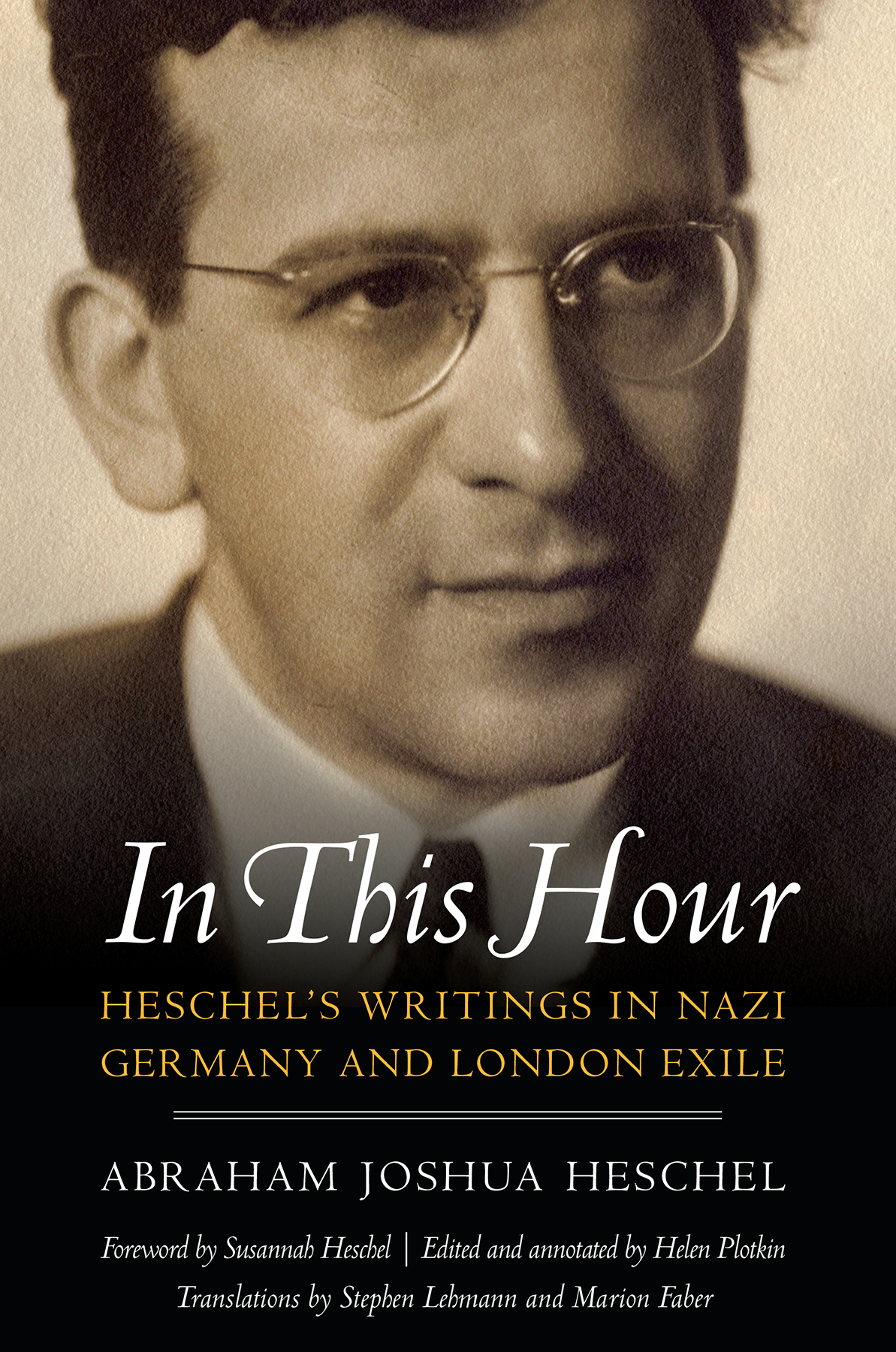
This is a tremendously important work of testimony and erudition in the service of saving Jewish history and the Jewish people from oblivion. The essays fill a significant void in Heschels bibliography. The academic community will welcome the relatively unknown aspects of Heschels development as a teacher and public intellectual, and all readers will appreciate Heschels gripping literary testimony in impeccable translation.
Edward K. Kaplan, author of Abraham Joshua Heschel: Prophetic Witness
Just when we thought the luminous Heschel canon was complete, we are gifted with this extraordinary volume a treasure trove of Heschel essays and speeches that have never before been seen in English. At a moment when civility and spirituality hang in the balance, these excavated words from one of our seminal thinkers and teachers could not be more timely or challenging. I hope you give yourself the immense pleasure and education of delving into In This Hour.
Abigail Pogrebin, author of My Jewish Year: Eighteen Holidays, One Wondering Jew
A deep learning characterizes all of Heschels writings. Here, in particular, Heschels extended meditations on Talmudic learning and on repentance are extraordinarily illuminating. The original writing is at once rigorously analytical and prescriptive, at times exhortative and elegiac, and the translation commendably conveys the spare elegance of the prose. Furthermore, the introductions and notes provide historical and personal context in impressively erudite and engaging ways.
Nathaniel Deutsch, author of The Jewish Dark Continent: Life and Death in the Russian Pale of Settlement
This collection of early writings by Abraham Joshua Heschel significantly expands our awareness of his full oeuvre. Readers of Heschel will want to see these prior confrontations with key issues and Heschels earliest stages as an activist in response to Nazi persecution.
Rabbi Arthur Green, coeditor of A New Hasidism: Roots and A New Hasidism: Branches
These essays brilliantly portray the intellectual development of a shining twentieth-century Jewish thinker and leader. This book is an indispensable part of Heschels legacy to us.
David Teutsch, Louis and Myra Wiener Professor of Contemporary Jewish Civilization Emeritus, Reconstructionist Rabbinical College

Hesed vemet al-yaazvuchaLet not kindness and truth forsake you (Proverbs 3:3)
In gratitude to Dr. D. Walter Cohen zl for his devotion to knowledge and for his exemplary leadership of and support for the Jewish Publication Society
From the JPS Board of Trustees
In This Hour
Heschels Writings in Nazi Germany and London Exile
Abraham Joshua Heschel
Foreword by Susannah Heschel
Edited and annotated by Helen Plotkin
Translations by Stephen Lehmann and Marion Faber

The Jewish Publication Society | Philadelphia
University of Nebraska Press | Lincoln
2019 by Susannah Heschel
Published by the University of Nebraska Press as a Jewish Publication Society book.
Cover designed by University of Nebraska Press; cover image by Lotte Jacobs. From Abraham Joshua Heschel Papers, David M. Rubenstein Rare Book & Manuscript Library, Duke University.
Author photo: Heschels Ausweiskarte (identification card) at the Hochschule fr die Wissenschaft des Judentums. From Abraham Joshua Heschel Papers, David M. Rubenstein Rare Book & Manuscript Library, Duke University.
All rights reserved.
Names: Heschel, Abraham Joshua, 19071972, author. | Heschel, Susannah, author of foreword. | Plotkin, Helen C., editor. | Lehmann, Stephen, translator. | Faber, Marion, translator.
Title: In this hour: Heschels writings in Nazi Germany and London exile / Abraham Joshua Heschel; foreword by Susannah Heschel; edited and annotated by Helen Plotkin; translations by Stephen Lehmann and Marion Faber.
Description: Lincoln: University of Nebraska Press, [2019] | Published by the University of Nebraska Press as a Jewish Publication Society book. | Includes bibliographical references.
Identifiers: LCCN 2018047755
ISBN 9780827613225 (cloth: alk. paper)
ISBN 9780827617988 (epub)
ISBN 9780827617995 (mobi)
ISBN 9780827618251 (pdf)
Subjects: LCSH : Judaism20th century. | Jewish philosophy20th century. | TannaimBiography. | Abravanel, Isaac, 14371508. | Jewish education.
Classification: LCC BM 580 . H 47 2019 | DDC 296dc23 LC record available at https://lccn.loc.gov/2018047755.
The publisher does not have any control over and does not assume any responsibility for author or third-party websites or their content.
In this hour we, the living, are the people of Israel. The tasks, begun by our patriarchs and prophets and continued by their descendants, are now entrusted to us. We are either the last Jews or those who will hand over the entire past to generations to come. We will either forfeit or enrich the legacy of the ages.
Abraham Joshua Heschel, The Earth Is the Lords
Contents
Susannah Heschel
When my father arrived in Berlin as a twenty-year-old student in 1927, he thought he had arrived at the center of the intellectual universe. He was dazzled by the scholarly riches not only at the University of Berlin, but also at the two rabbinical seminaries, Orthodox and Liberal, all located at the heart of the city, a neighborhood that also was home to thousands of Polish Jews, recent immigrants. An abundance of synagogues led by learned rabbis appealed to him, though he most often attended the small Orthodox synagogue of Rabbi Yehiel Weinberg, one of the deeply learned authorities on halachah (Jewish law) and also a person of great charm and warmth; when I was a child, we visited him in Montreux, Switzerland.
Berlin in the late 1920s was a city of great theater, concerts, lectures, and intense conversations and debates. As a child, I loved asking my father about his student days and imagining what his life was like. He was terribly poor; often he could afford to eat only potatoes for weeks on end. He would rent a room from a Jewish family, either near the university or in Charlottenburg, a neighborhood with mostly middle-class German Jews. Often other students also rented rooms with those families, and my father enjoyed the intellectual exchanges with them. He described his student years as filled with intense studyindeed, he was always reading, either a Hasidic text or a work of philosophybut he also enjoyed the excitement of Weimar culture. Always wanting to explore and understand different ways of thinking, he took courses at both the Orthodox and Liberal Jewish seminaries, and was one of very few students to have been welcome at both. Although he already had received Orthodox rabbinical ordination while in Warsaw from Rabbi Menachem Ziemba, he wanted to know how liberal Jews approached classical Jewish texts. The weekly salon he joined at the home of Jewish sociologist David Koigen on Mommsenstrasse was a chance for intense discussion of the Jewish future. On other evenings my father would go to poetry recitations, often of the poet Stefan George, though he was more inclined to the work of Rilke.
My father was part of a generation of Jewish thinkers who were both products of the great German intellectual and scholarly achievements and, at the same time, severe critics of German ways of thinking. Philology had certainly accomplished much in the study of religious texts, but it was not able to convey the essential significance of those texts: why people are religious. There was something deadening, he thought, about the synagogue services in Germany: a formality and regulation of behavior that my father felt hindered rather than enhanced prayer. The intensity of religious devotion he had experienced in the Hasidic world of Warsaw was for him authentic Jewish piety.
Next page
